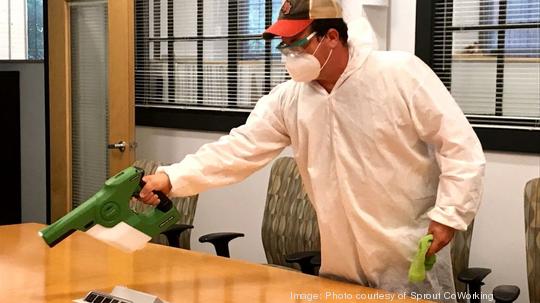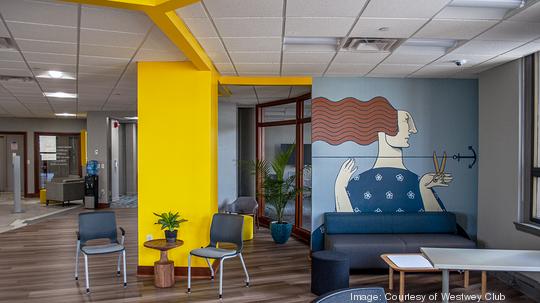
Here we are at the end of 2020, a year that has been nothing but tumultuous. At the beginning of the year, few among us would have thought we would be where we are now. We are living through a once-in-a-generation pandemic, with a disease that has upended every aspect of modern life, highlighted social and economic inequities past the point of ignoring them and put national and local government responses in a harsh new light.
We have also lived through an entirely new era of innovation. Rhode Island startup leaders have made countless pivots born out of sheer necessity. They have worked to connect from afar; they have boosted new projects and ventures with the launch of all-new innovation campuses; they have led teams to new funding rounds and even acquisitions.
It's an admirable thing to look to the future during a year like this. Rhode Island's innovation economy will be better for that optimism.
These are the stories that shaped 2020.
Rhode Island leaders stepped up to the pandemic in major ways.
Just over a month into the pandemic in the U.S., Allyson Cote quit her day job to head up Ocean State Shields, a venture inspired by the Covid-19 pandemic that distributes industrial disinfectant and disinfected products. The startup was made for this moment, but Cote has plans to continue long after the pandemic subsides. Ocean State Shields sells a line of protective equipment and antimicrobial, nontoxic disinfectant spray that can ward off viruses for up to 90 days.
Other entrepreneurs worked to fight the ripple effects of Covid-19 in their own ways. A group of students launched Intern From Home, a job platform specifically for remote internships. Candoo Tech, a remote and in-person tech support service for seniors, scaled rapidly to keep nursing home residents connected to their families. A ragtag team of professors, university students, amateur 3D printers and health care professionals, calling themselves the "Rapid Responders," began manufacturing personal protective equipment for hospital workers amid shortages.
"In looking at the landscape of what happened in Providence, a lot of businesses are literally on the verge of collapse," Cote told Rhode Island Inno in April. "We understand the economic hardships that everybody's facing. We're not a pop-up venture. We're not going to disappear in three months."

More innovation hubs emerged statewide.
Ørsted U.S. Offshore Wind, builder of the nation’s first offshore-wind farm off Block Island, opened its Providence innovation hub in March as the first stop for companies looking to do business with the Danish giant. The hub is at 225 Dyer St. in Providence, the same building that houses District Hall Providence, MassChallenge Rhode Island and several other organizations — and that arguably became a startup hub in its own right this year. Over the summer, RIHub, an innovation campus funded by a state bond, also made its official launch in the same building, which is colloquially known as "Point 225." RIHub is part incubator and part accelerator, with resources like mentorship and events in its wheelhouse as well.
Meanwhile, in Portsmouth, another innovation campus was taking shape. 401 Tech Bridge debuted in August with $6 million from the U.S. Economic Development Administration and a consortium of state and nonprofit organizations. The site aims to be a "superconnector," bridging the gaps among tech startups, materials companies and government agencies. It got another boost this month when the Rhode Island Commerce Corporation unanimously approved $1.5 million in state incentives.
Coworking spaces expanded (in spite of everything).
Not to be deterred by the Covid-19 pandemic, Sprout Coworking in Providence expanded its existing office, meeting and event space by 25 percent in June. The renovation added five private offices, a large meeting room and parking spots, along with other amenities. Just a few months later, coworking chain Aurelius Coworks opened a new space in the Turks Head building in Providence: the Westwey Club, which offers a mix of flex desks and private offices on the 11th floor. In an interview with Rhode Island Inno, Aurelius founder and CEO Tom Nardacci called Providence's coworking market "way underserved" — "Providence should probably have a million square feet of flexible space," he said.
Coworking spaces also had to adapt quickly to keep their doors open — safely — while retaining members. Venture Café Providence, the sister organization of District Hall Providence, took its programming virtual back in March. Sprout Coworking made hand sanitizer and disinfectant available to its members, then partnered with Ocean State Shields to fortify surfaces against the virus in both its Providence and Warren locations. And upon opening, the Westwey Club team signed a contract with Cintas to provide hand sanitizer stations, then had the building's landlord install MERV 13 air filters, which can trap viruses.

Rhode Island-born companies inked some significant deals.
Rhode Island Inno readers know that the Ocean State is a great place to build a company, but this year, it seems that fact became clear to outside investors, too.
SquadLocker, the Warwick-based startup behind custom athletic apparel, secured $20 million in Series C financing in February with plans to expand its growth initiatives. (The company is already profitable, co-founder Gary Goldberg told Rhode Island Inno in March.) The Wanderlust Group, the parent company of marina management software provider Dockwa, pulled in $14.2 million in October and announced plans to expand its technology to RV sites. Premama Wellness, a Providence-based startup that sells supplements for maternity wellness, attracted its first institutional investor since launching in 2011 when District Ventures Capital led a $3.5 million seed round in the company.
But the biggest deal of the year took place just this month, when Upserve, the 11-year-old restaurant management platform provider, sold to Canadian firm Lightspeed POS for $430 million. While Upserve's integration into the Lightspeed brand will mark the end of an era for Rhode Island's best-known and top-funded startup, its legacy will live on in the local innovation scene for some time.
"I think it's a great case study for other technology companies that may be interested in coming to the state, as an example of a startup from way back — 11, 12 years ago to now," said CEO Sheryl Hoskins. "It can definitely showcase the potential that can happen in Rhode Island."







